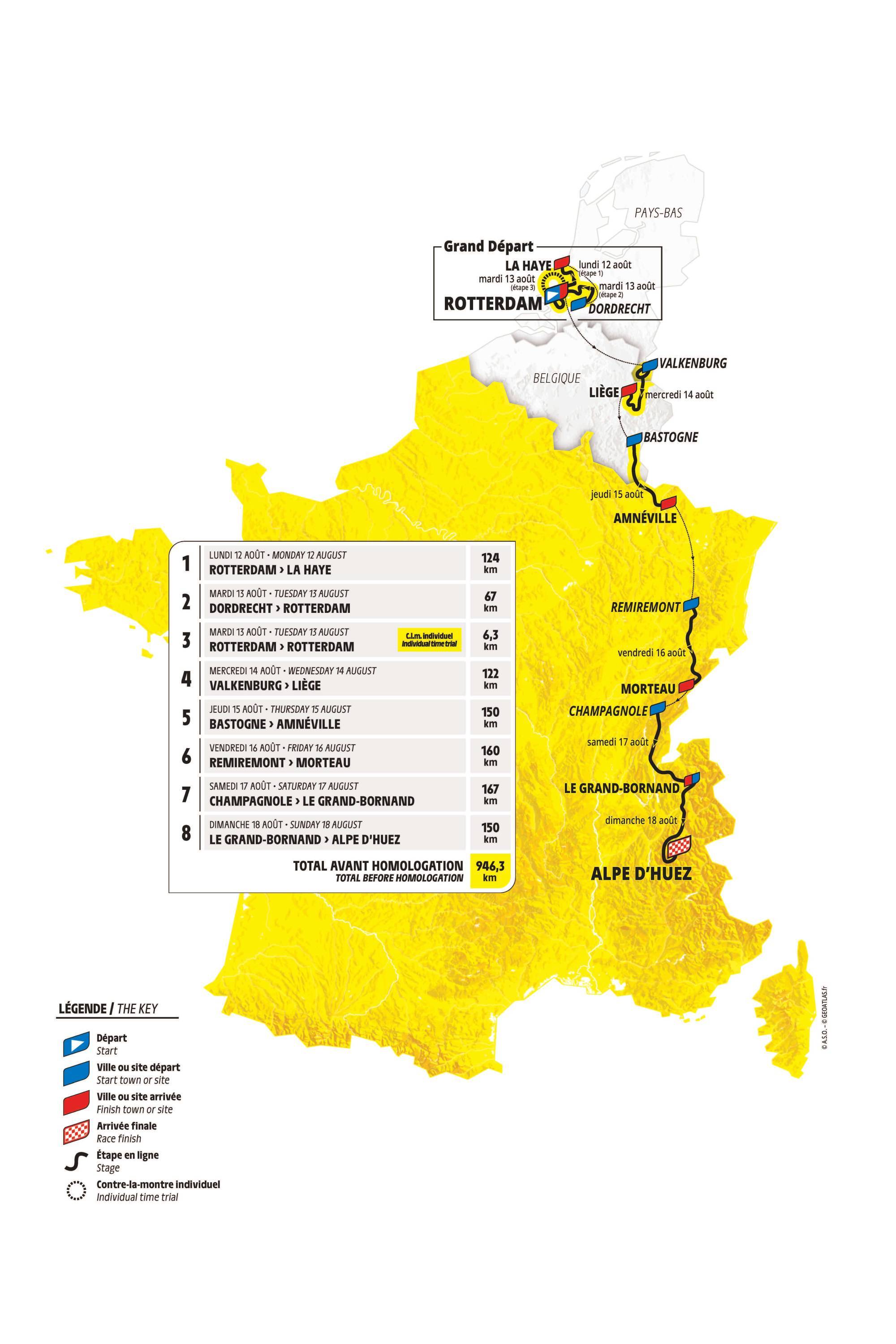Tour de France 2024 route revealed as race finishes outside Paris for first time in 120-year history
The race will begin in Italy for the first time and end in Nice rather than Paris as the capital turns its attention to the Olympic Games
The unique 2024 Tour de France will begin in Florence and end with a potentially dramatic time-trail in Nice, as the race finishes outside Paris for the first time in its 120-year history while the capital focuses on the Olympic Games.
In another first, Italy will host the Grand Depart and the first three stages of the race, before an early climb into the Alps on stage four, from the Italian town of Pinerolo to Valloire in France. The race will then head to the vineyards around Dijon, the Massif Central and over the Pyrenees, before returning to the French Alps and down to the Riviera for a finale against the clock, from Monaco to Nice.
The final section in the Alps is set for a stage 20 showdown on the Col de la Couillole (15.7km at 7.1 per cent average gradient), ahead of the first competitive 21st stage since 1989, as a time-trial replaces the traditional Parisian parade before a sprint on the Champs-Elysees.
“It’s difficult to replace Paris, so what better scenery could we give than than a dazzling Monaco to Nice time-trial,” said race director Christian Prudhomme, at the route’s unveiling. Of the stage-four ascent in the Alps, he added: “The Tour has never climbed so high, so early.”
The Tour de France Femmes will also break new ground when it begins abroad for the first time, with the first three stages to be held in the Netherlands. And the women’s race is set for an eye-catching finish atop the iconic Alpe d’Huez.

“We went to the Tourmalet last year, we wanted to go to iconic places and L’Alpe d’Huez is part of cycling’s history,” women’s Tour director Marion Rousse said. “It’s the toughest stage in Tour de France Femmes history with 4,000m of altitude gain. The stage also features the Col du Glandon, which I think is the hardest in France. Women have proved they have the level for that.”
Eight of the men’s 21 stages are categorised as ‘flat’ days but in reality there are few clear-cut opportunities for the sprinters, something noted by Mark Cavendish after the Manxman, who will be 39 when the race rolls around, reversed his decision to retire earlier this month.
“It’s so hard,” Cavendish told reporters after assessing the route. “I am actually in a bit of shock. It might be the hardest route I’ve ever seen at the Tour de France.”
Geraint Thomas, a year younger than Cavendish, has signed a new two-year contract with Ineos Grenadiers, which he says is likely to be his last, and the 2018 yellow-jersey winner could feature in the race, although Ineos’s focus will be on younger riders like Tom Pidcock, who continues to balance his love of mountain biking with grand tour racing.
After a mixed performance at this summer’s Tour de France, Ineos will hope for a yellow-jersey challenge from one of their riders, most likely the young Spaniard Carlos Rodriguez, who finished fifth and has just signed a four-year contract extension, quashing rumours of a transfer away.
But he will face a difficult challenge once more, with reigning champion Jonas Vingegaard set to return as the man to beat. Two-time winner Tadej Pogacar will among the favourites should he be fit and ready on the startline, while Belgian multiple world champion Remco Evenepoel is likely to make his Tour debut and four-time grand-tour winner Primoz Roglic is looking for a new team to lead.
“Could this herald a duel playing out between two, three, or – let’s dream a little here – even four contenders?” Prudhomme said.
The men’s race will run from 29 June to 21 July. The Olympics will begin five days after the Tour de France ends, and authorities did not want to stretch police resources in Paris, prompting the decision to finish on the south coast.
The women’s race will begin the day after the Games close, on 12 August, culminating in the Alps on 18 August.
Join our commenting forum
Join thought-provoking conversations, follow other Independent readers and see their replies
Comments
Bookmark popover
Removed from bookmarks